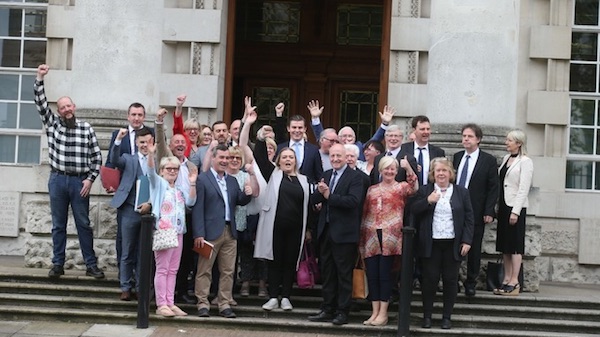
Following a damning judgement at the Court of Appeal in Belfast earlier today [Friday], the PSNI has been forced into establishing an independent investigation into the British state’s role in a killing machine that left more than a hundred people dead.
Chief Justice Declan Morgan rejected an appeal by former PSNI chief George Hamilton against a judgment that the force’s failure to conduct an overarching examination was a breach of human rights legislation.
The Glenanne gang counted Crown Forces personnel among its members, including members of the RUC (now PSNI) police. Operating mostly in Tyrone and Armagh, the loyalist gang has been blamed for around 130 killings over a number of years.
PSNI chief Simon Byrne has already said he accepts the judgement. “While we will take time to consider the fullness of its implications, we will now commence work to appoint the independent police team to conduct an analytical report on collusion as ordered by the court,” he said.
The Glenanne Gang’s attacks include outrages such as the 1975 Miami Showband Massacre, where three members of the popular group were taken from their tour bus and shot dead on a country road in Banbridge, County Down, and the Step Inn pub bombing in Keady a year later, which claimed the lives of two Catholics. It has also been linked to the murder of 33 people, including a pregnant woman, in the 1974 Dublin and Monaghan bombings.
The Historic Enquiries Team (HET) had partially completed a probe into the activities of the gang before its work was suddenly halted by PSNI commanders.
The PSNI’s decision to stop the HET review had to be challenged by way of judicial review by the family of one of the gang’s victims. The case against the PSNI was taken by Edward Barnard, whose 13-year-old brother Patrick was killed by the gang in 1976.
Outside court, Mr Bernard welcomed the judgment, though he noted that 20 relatives of Glenanne victims had died since the initial judicial review proceedings commenced in 2015.
He said the PSNI had treated the families like “pestilence”.
“For the families here today we will keep on fighting for the truth for our dead relatives, because with the truth we honour them,” he said.
Families of those killed filled the public gallery and lined the aisles to hear the response to the appeal. Outside the court, Eugene Reavey, whose three brothers were murdered by members of the Glenanne gang in south Armagh in January 1976, said: “I would like everybody to know - it was not the UVF who shot my brothers, it was the security forces - the UDR and the RUC and the British Army.”
Mr Reavey said the investigation needed to be time-limited to five years. He said he was not interested in compensation and all he wanted was the truth. “It’s not hard to tell the truth,” he said.
Tracey Mulholland, whose grandfather Arthur Mulholland was killed in 1975, said: “Let this begin now, as the judges have ruled, let it begin immediately, so that we don’t lose any more of our people.
“This isn’t going away - there are grandchildren coming down the line and this will go on. We will fight and we will remain strong so that truth and justice can be given to these families.”
She said the families felt vindicated. “We all knew there was collusion,” she said. “We have been vindicated because we were called liars in the past. It has taken this long, people here have waited over 40 years for something like this to happen - it’s a disgrace.”
Ms Mulholland and other relatives criticised Hamilton -- who has recently been knighted for services to the Crown -- for cravenly not attending the court hearings in person.
Lawyer Darragh Mackin said it was a “momentous day” for the Glenanne families.
“It has been a long, long road to get to this day but thanks to publications, documentaries and now court judgments these families have been exonerated, they have been vindicated, the court has told us today what we always knew - that there was a state policy of collusion relating to the Glenanne series,” he said.
Sinn Féin’s Victims spokesperson Linda Dillon said the courts first ruled that the PSNI had failed in its responsibilities two years ago.
“Regrettably, rather that implement that decision, the PSNI has sought to frustrate and delay progress and justice by appealing it.
“That appeal has now failed and the court was clear that an independent investigation must take place into the brutal campaign carried out by the Glennane Gang in league with the RUC and British Army at that time.”
Aontú’s representative in Armagh, Martin Kelly, called for the investigation into the “shocking” killing campaign to take place in a timely manner and be properly resourced.
“The British government has refused to hand over files relating to over 120 murders committed by the Glennane Gang. A comprehensive and far-reaching investigation is needed with full co-operation” he said.
“No-one has been held accountable yet. Families have waited for too long for justice. This Court of Appeal ruling has offered some hope to those seeking the truth, but an investigation must be held without delay, with as much funding as is necessary.”
![[Irish Republican News]](https://republican-news.org/graphics/title_gifs/rn.gif)
![[Irish Republican News]](https://republican-news.org/graphics/title_gifs/harp.gif)

